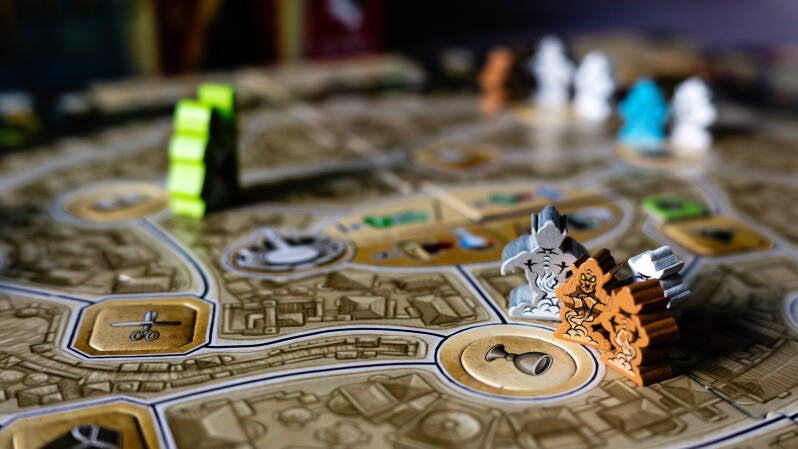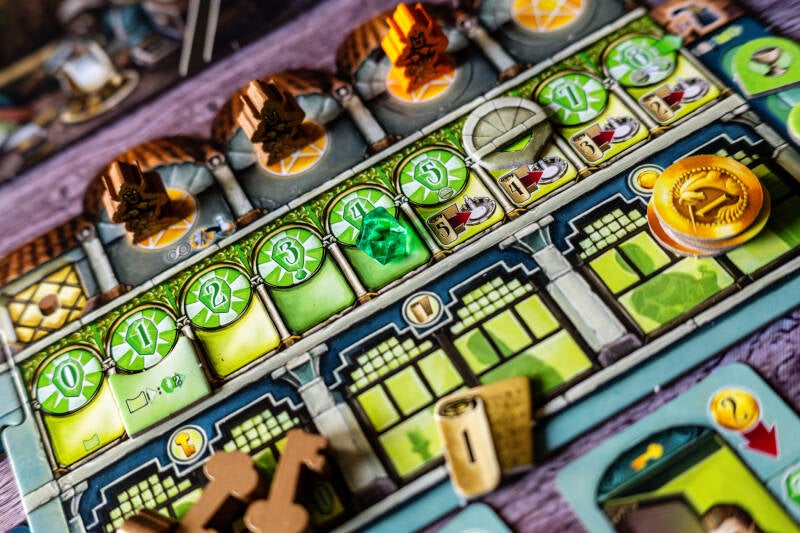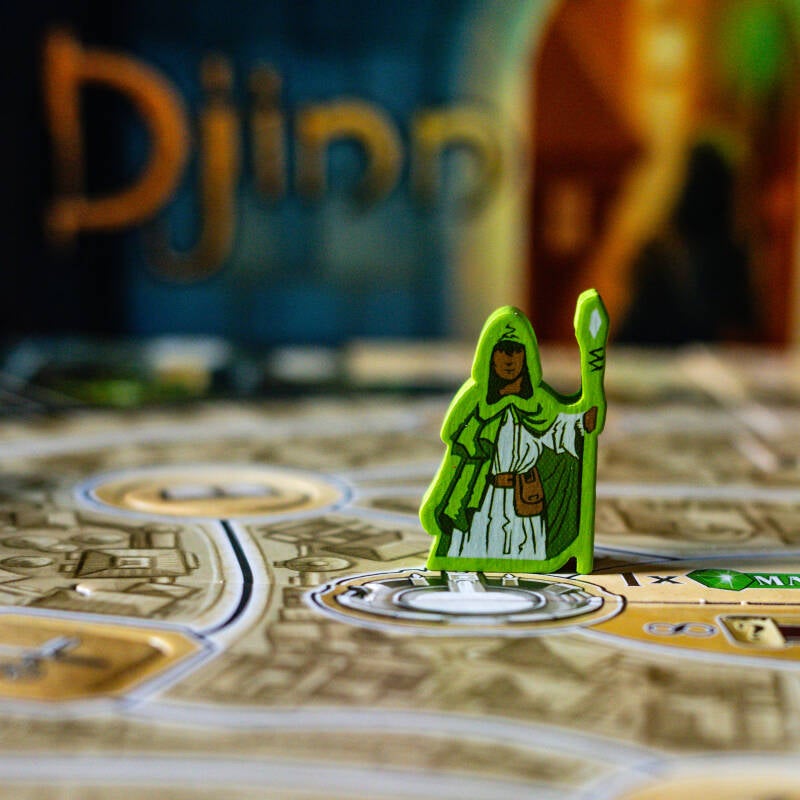Djinn... hold the tonic


In Djinn, you are mage, walking around town from one action spot to the next. Each of the 6 possible actions has 2 action fields: a "normal" variant with a square field, and a "strong" variant with a round field. The actions are connected by lines, think of them as streets in the city along which you move. You always move to the next action space (so - in principle - you may not skip one) and you may not retrace your steps - that's why the mage meeples are printed on both sides with a clear front and back, it is then always clear from which direction you came. The network of action spaces is laid out in such a way that you alternate between a normal and a strong action. When you land on an action field where an opponent is already standing, you must pay that opponent a resource, or you can choose to travel on to the next action field. The actions let you collect resources (which are coins, parchment scrolls, but also magic), buy magical equipment, hire other mages as assistants, open treasure chests, and, of course, also buy bottles and corks to imprison the djinns you catch forever and ever.
Gotta catch 'em all!
Because that is the goal of the game: catch djinns. The round (strong) action spaces are guarded by a bunch of djinns. Each group consists of a boss djinn and a few minor djinns. When you perform the action of such a field, you must also try to capture at least 1 djinn. If you can't or won't, it will cost you 1 magical energy from your supply - and that magical energy is just what you need to catch those djinns. You collect that magical energy through actions, but your storage space is limited - so you will also want to call on mages you hire to give you extra magic. Djinns that you catch can either be caught immediately in a corked bottle, if you have one in stock, or temporarily on your player board - there you have room for 2 djinns at the start of the game, but you can expand this to 4 magic cells. At the end of the game, djinns you have bottled are worth much more points than the djinns you have left on your player board, though. You may capture as many djinns at a time as you can, but of course you will need sufficient magical energy. A regular djinn requires 4 magical energy to capture, a boss djinn draws its power from the presence of other djinns on that field: for each other djinn, you need 2 extra energy to capture the boss. But it does pay to go for the boss: when you capture a boss, you may capture an ordinary djinn from its group for free and for nothing ... if, of course, you have enough space to contain it too.
The game ends once all 6 boss djinns are captured or chased away (they flee from the board when the ordinary djinns of their group are captured). When the boss is captured or driven away, new djinns do appear on that action space, that way there still remain enough djinns to keep it interesting for each player.

In Djinn, it comes down to stringing together actions in the best possible order so that you can capture djinns as often as possible. The djinns come in 4 different colors, and you must have a bottle of the corresponding color to put the djinn in. The boss djinn can be put into any color bottle. There is also an element of set collection in the game: when you have 3 bottles of the same color with a captured djinn in them, you can exchange them for a trophy: that trophy gives you an immediate advantage, as well as the points you would otherwise receive at the end of the game for the 3 djinns (10 points per djinn, so 30 points). As a result, sometimes you'll want to be the first to catch a group of djinns so you can be sure to catch certain colors, while sometimes it's more convenient to only take your chance later, when some djinns have already been caught, that boss djinn is just a little easier to catch.
Replayability and strategic agility through modular setup
The game board has a modular setup: the action spaces can be clicked in a different place with each game.
The advanced variant gives the game more depth without necessarily making it more complex. This variant includes, for example, 3 goals that give you extra points at the end of the game if you achieve them, and you can also drafte two tiles at the beginning of the game, one with a negative effect on your game and one with a positive effect. These give your strategy more direction because they give you an extra bonus for a certain action, for example. The magic clothes you can purchase in the game also give you a one-time or permanent effect, these too can further strengthen a certain strategy.
Look & feel
OK, the board looks mostly very beige. Fortunately, the rest of the components offset that beige blandness a bit. First and foremost: the colorful meeples. Both djinns and mages are printed on both sides. Mage and clothing cards also bring some extra color to the table. Some tokens (such as money and parchments) are simply cardboard, while the keys are gold-colored wooden shapes, and the green marker to keep track of your magic is a nice little gem.
The actions are generally easy to follow, and clear iconography on the board makes them clear, even while playing, eliminating the need to refer back to the game rules.



Solo
I also played the game solo, but I liked that variant a lot less than multiplayer. With a solo game you leave out the elements of the advanced variant (and they make it just as much fun!). The game then becomes a race against an automaton with a deck of cards. Each time you perform a strong action, you turn over a card from that deck and possibly a few more djinns come onto the board. The goal of the solo game is to capture or dispel all the boss djinns before you get through the automaton deck. But you don't have other mages getting in your way around town....
Verdict
Strategic Depth: Djinn is a decent medium-weight game. With the variable set-up the actions will chain in different ways every time you play. The equipment cards you collect let you tweak your strategy a bit, but not as much as a tableau builder or engine builder would do – you also don’t have ways to choose the equipment: you just take the top card from the respective deck. I do love the asymmetrical player powers: in an advanced variant players draft a positive power and a negative drawback at the start of the game. Those really make the game more interesting, and I would never play without those, especially with experienced boardgamers. I did feel, as is often the case when playing a game that has player actions determine when the game ends, that there is a pull to prolong the game (not defeating the last boss djinn) in order to scrape a couple more extra points. This can make the game outstay its welcome, until one player finally had enough of it and rushes to the other side of the board to finish the genie already.
- Theme: I love the theme and the components are top notch!
- Ease of learning/teaching: The rulebook is okay. I do want to point out the main board: it has all the actions represented with icons, so you don’t need to go back to the rulebook while playing. The player aid lists the costs of fighting djinns and the steps in end-game scoring.
- Player interaction: I had expected more interaction. There is some interaction if you land on an action space with another player present, but it is mutes as this will not always cost you a scroll or a coin: only when that other player is in the same ‘street’ as you (so they entered the action spot coming from the same direction as you). It is very easy to work around that, you will probably only do that in case you really can’t delay going to that particular spot any longer. You will of course race for the djinns, so you might curse your opponent for getting to a certain spot before you and taking the djinn(s) you had your eyes on…
- Happiness: For me, Djinn is a solid euro that will bring enjoyment to both novice and advanced players. Because of the modular elements, replayability also sits well. It's not a high-roller for me, in the sense that I'm not blown away, but it’s an enjoyable game nonetheless. It will therefore definitely give me a few more evenings of fun, but after that I’m not sure I will return to it…